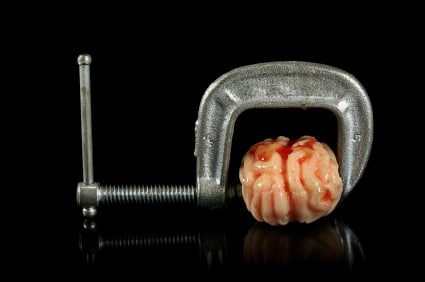 We’ve discussed smoking leading to smaller brains in “Enhance Your Memory – Quit Smoking” . According to this Yale study you can now add stress and depression as other causes of brain shrinkage. Stress and depression are growing problems for many Americans. More than 60% of visits to primary care physicians are felt in part to be stress related.
We’ve discussed smoking leading to smaller brains in “Enhance Your Memory – Quit Smoking” . According to this Yale study you can now add stress and depression as other causes of brain shrinkage. Stress and depression are growing problems for many Americans. More than 60% of visits to primary care physicians are felt in part to be stress related.
Clearly one of the best steps you can take towards improving your overall health and longevity is learn to avoid, recognize, and manage stress. Stress has many causes and much of it is self-induced by our fast paced lives, the “need” to overextend ourselves, and so on.
Stress and depression many times go hand in hand.
More Stress, Less Brain Synapses
The Yale study investigated the premise that stress leads to a loss of brain synapses or connections. Brain cells are connected via synapses to many other brain cells. The more and stronger those connections the better the brain functions. We naturally lose some of these connections as we age, and neurodegenerative diseases like Alzheimer’s disease are associated with more rapid loss of neural connections.
The Yale researchers discovered that stress turns on a gene called GATA1 that turns off several genes that are play a role in the development of synapses. More specifically they discovered that brain circuits linked to emotion and cognition were disrupted when GATA1 was activated.
And, activation of GATA1 was associated with depressive behavior. It’s important to recognize that this part of the study was performed in rodents. But the researchers also compared brains of deceased depressed and non-depressed individuals and found that depressed humans had fewer synapses than non-depressed humans.
It is hoped that this and future research might lead to medications and techniques that enhances the ability to grow and maintain brain synapses.
Affects of Stress and Depression on Health
Stress wreaks havoc on our health in many other ways beyond its effects on the brain. Here are some of the more common problems.
- Shortens telomeres
- Increased risk of heart disease
- Increased risk of stroke
- Decreased sleep
- Decreased immune function
- Weight and body composition changes
Maintaining healthy telomeres is the ultimate key to healthy aging. Stress shortens telomeres equivalent to 10 years of aging. This is more than the shortening of life span caused by smoking and obesity.
Stress leads to increased blood pressure, can affect cholesterol levels, and places more demand on the heart and cardiovascular system and increases the risk of stroke, too. Another key to healthy living and aging is obtaining adequate amounts of restful sleep. Stress frequently leads to insomnia. Sleep is when the body does most of its repair work. And, poor sleep itself is associated with decrease brain performance.
We are more likely to suffer infections when we are stressed as immune system function is suppressed. This also increases the risk of cancer. Stress and depression also affect appetite and weight. In some, stress is associated with decreased appetite and weight loss, and in others stress and depression are related to an increased appetite and weight gain.
Stress really is a killer. See related articles.
